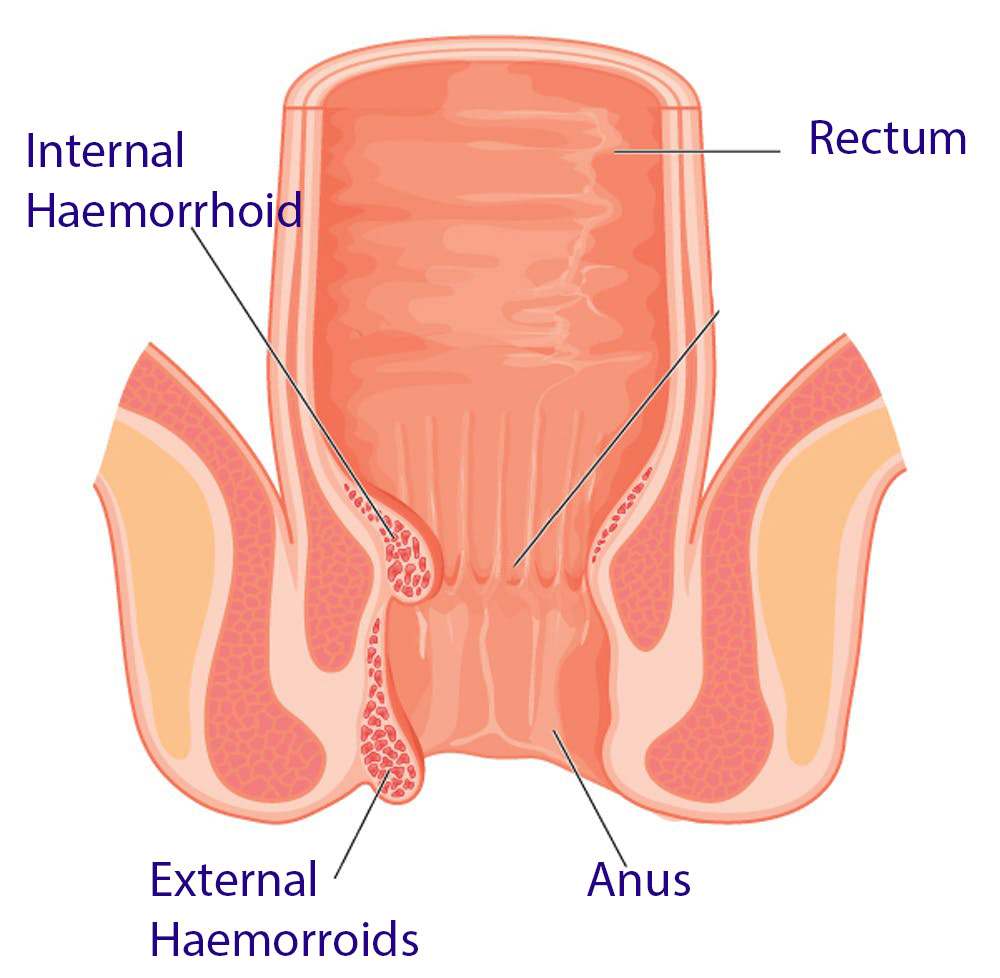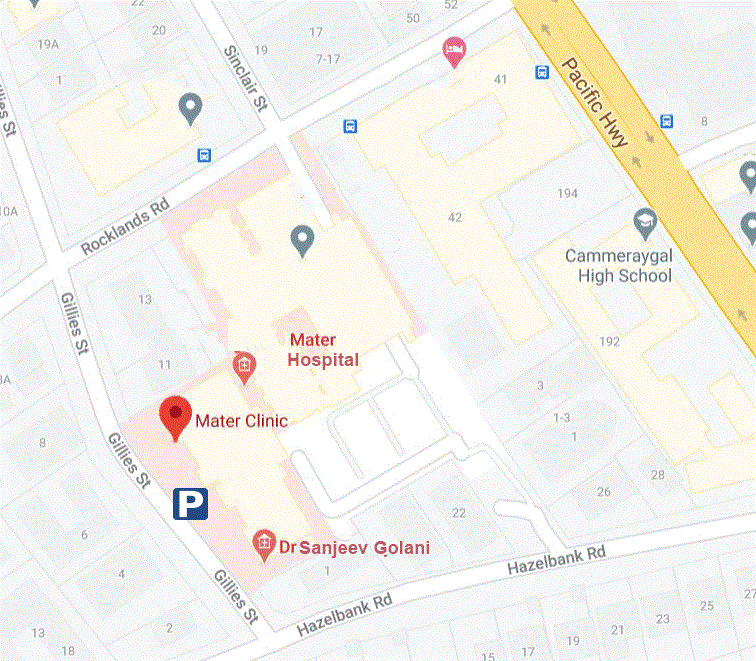Haemorrhoid Surgery
What are haemorrhoids?
Haemorrhoids, commonly called piles, are swollen veins inside or around the anal passage. These enlarged blood vessels become inflamed and engorged, causing discomfort, bleeding, and irritation. Factors such as constipation, prolonged sitting, pregnancy, or heavy lifting can heighten the risk of developing haemorrhoids.

Common Symptoms of Haemorrhoids
If you experience any of the following symptoms, you may have haemorrhoids:
- Bleeding: Bright red blood on toilet paper or in the toilet after a bowel movement
- Second degree haemorrhoids bleed and stick out of the anus when you pass a bowel motion. Once the bowel motion is over, they disappear back inside the anus by themselves
- Third degree haemorrhoids must be physically pushed back inside the anus after passing a bowel motion. They may be painful if they are large
- Fourth degree haemorrhoids are larger lumps that stick out of the anus permanently and cannot be placed back inside. The blood inside these haemorrhoids may clot and the lumps can become very painful.
What causes haemorrhoids?
Haemorrhoids are usually caused by chronic constipation (having hard bowel motions that are difficult to pass). Constipation causes you to strain when you go to the toilet. This puts pressure on the blood vessels in the anus, making them swell. Other things can increase the chance you will get haemorrhoids:
- ageing
- being overweight
- having diarrhoea
- spending long periods of time on the toilet
- regularly lifting heavy objects
Haemorrhoids are particularly common during pregnancy. This is because constipation is quite common in pregnancy, but also:
- the growing baby places pressure on the abdomen
- there is more blood flowing through the body
- Progesterone hormone produced during pregnancy enlarges the blood vessels
These haemorrhoids often disappear after pregnancy and might not need treatment. Haemorrhoids may also be more common in some families than in others.
How are haemorrhoids diagnosed?
Diagnosis of haemorrhoids usually involves an examination of the anal passage to look for any swollen blood vessels. Your doctor may conduct one of the following tests.
- Digital rectal examination, where your doctor puts on gloves and places a lubricated finger inside the back passage to gently feel for any abnormalities. This is likely to be uncomfortable but will probably not be painful.
- Proctoscopy, where your doctor examines the inside of the rectum using a proctoscope (a hollow tube with a tiny light at the end) to look for any swelling or other symptoms. Again, this may be uncomfortable but will probably not be painful.
- Rubber band ligation, where a very tight elastic band is placed around the haemorrhoid to cut off its blood supply. This causes the haemorrhoid to fall off and be passed out of the body within 7 to 10 days.
- Haemorrhoidectomy, is the gold standard procedure for treating third degree and fourth degree haemorrhoids. It has the highest success rate in treating haemorrhoids
- Doppler guided ligation of haemorrhoidal artery is a new procedure that has the advantage of less postoperative pain compared to haemorrhoidectomy
- Doppler Ultrasound: The procedure begins with the use of a Doppler ultrasound device. This device helps the surgeon locate and identify the haemorrhoidal arteries that are supplying blood to the swollen haemorrhoidal tissue. The Doppler ultrasound allows for precise localisation of these arteries.
- Haemorrhoidal Artery Ligation (HAL): Once the arteries are identified, the surgeon uses a special instrument to tie off (ligate) these arteries. By blocking the blood flow to the haemorrhoidal tissue, it reduces the swelling and eventually causes the haemorrhoids to shrink.
- Recto-Anal Repair (RAR): In addition to addressing the arteries, Dr Golani may also use sutures or other techniques to repair and reshape the anal or rectal tissue as needed. This helps to correct any structural problems that may be contributing to the development of haemorrhoids.
- Minimally Invasive: HAL-RAR is a minimally invasive procedure, which means it involves less cutting and disruption of tissue compared to traditional surgery. This results in reduced post-operative pain and discomfort.
- Outpatient Procedure: HAL-RAR is typically performed as day procedure, which means patients can go home the same day. There is no need for an overnight hospital stay.
- Faster Recovery: Patients usually experience a shorter recovery period with HAL-RAR. Many individuals can return to their regular activities, including work, within a few days to a week, depending on the severity of their condition.
- Reduced Pain and Discomfort: Because HAL-RAR involves ligation of the haemorrhoidal arteries and minimal tissue removal, it is associated with less pain and discomfort compared to traditional surgery. Most patients report less pain during the recovery period.
- Lower Risk of Complications: The risk of complications such as bleeding, infection, and anal stenosis is generally lower with HAL-RAR compared to traditional haemorrhoidectomy.
- Effective for Internal Haemorrhoids: HAL-RAR is particularly effective for treating internal haemorrhoids, which are located inside the rectum and are often more challenging to manage with conservative treatments.
- Minimal Scarring: Since HAL-RAR involves minimal cutting, it usually results in less scarring compared to traditional surgery, which can be important for cosmetic and functional reasons.
- Customised Treatment: The use of Doppler ultrasound allows for precise localization of the haemorrhoidal arteries, enabling the surgeon to tailor the treatment to the specific anatomy of each patient.
- Potential for Symptom Relief: HAL-RAR not only addresses the underlying cause of haemorrhoids by ligating the blood vessels but also corrects any structural issues in the recto-anal area that may be contributing to symptoms.
- Sydney Adventist Hospital, Wahroonga
- The Mater Hospital, North Sydney
- Norwest Private Hospital, Bella Vista
- Hornsby Ku-ring-gai Hospital, Hornsby
- Referral letter
- X-Rays/Scans
- Test results relating to referral
- Health fund card
- Medicare card
How are haemorrhoids treated?
Medicines
Ointments provide symptomatic relief. They don't cure haemorrhoids. Early first-degree haemorrhoids can be treated with lifestyle changes like decreasing weight, avoiding constipation, avoiding sitting on the toilet for too long.
Surgery
Doppler-guided haemorrhoidal artery ligation and recto-anal repair (HAL-RAR)
A new surgical technique to treat Haemorrhoids
Doppler-guided haemorrhoidal artery ligation and recto-anal repair (HAL-RAR) is a minimally invasive surgical procedure used to treat haemorrhoids, a common medical condition where the blood vessels in the rectal and anal area become swollen and inflamed. HAL-RAR is a relatively newer technique compared to traditional surgical approaches for haemorrhoid treatment.


How does HAL-RAR work?
Advantages of this procedure?
There are some key advantages of HAL-RAR over traditional haemorrhoidectomy (surgical removal of haemorrhoids) and other conventional treatment methods. These include:
It is important to emphasise that the likelihood of experiencing complications is relatively low, and many people who undergo HAL-RAR have a positive outcome with minimal complications. The procedure is generally considered safer and less risky than traditional haemorrhoidectomy. However, individual experiences can vary, and patients should follow the post-operative instructions carefully to minimise the risk of complications.
Patients considering HAL-RAR should have a thorough discussion with Dr Golani about the potential risks, benefits, and expected outcomes based on their specific condition and medical history. Additionally, they should promptly report any unusual or severe symptoms after the procedure to Dr Golani and their GP for evaluation and appropriate management.
Understanding the Costs of Haemorrhoid Surgery
We understand that the idea of surgery and its associated costs can be overwhelming. To get a better understanding of potential costs, you can review information about hospital and insurance options here. Please note that an initial consultation is necessary to confirm your diagnosis. Once your diagnosis is confirmed, we can provide a more detailed cost estimate for your surgery.
Your Consultation
Dr. Golani will provide further discussion regarding the specifics of your diagnosis during your consultation. Additionally, you'll have the opportunity to select the hospital for your procedure and potentially set the date for your procedure.
The best surgical hospitals in Sydney are available for your surgery:
To schedule a consultation with Dr. Golani, please contact our team for a consultation with Dr Golani. We have appointments available at three convenient locations across Sydney:

Please note that a GP referral will be required prior to your consultation.
Contact Us
To make an initial consultation booking, please contact our office on 02 8599 9819.
Click here to email usHornsby Clinic Address:
Madison BuildingSuite 7, 25-29 Hunter St,
Hornsby NSW 2077
Phone: (02) 8599 9819
Email: info@drgolani.com.au
Fax:(02) 9012 0976
HealthLink: drgolani

Our Horsnby clinic is located conviniently next to Hornsby Westfield & Hornsby Station
Click here for MAP LOCATION
Mater Clinic Address:
Suite 1.13, Level 1 Mater ClinicMater Hospital
3-9 Gillies St, North Sydney 2060
Phone: (02) 8599 9819
Email: info@drgolani.com.au
Fax:(02) 9012 0976
HealthLink: drgolani

Our Mater clinic is located within Mater Hospital. Parking and Entry (convenient Pickup and Drop Zone) is via 5 Gillies St, Wollstonecraft.
Click here for MAP LOCATION
Norwest Clinic Address:
Suite 301C, Level 3Q Central Building
10 Norbrik Dr, Bella Vista NSW 2153
Phone: (02) 8599 9819
Email: info@drgolani.com.au
Fax:(02) 9012 0976
HealthLink: drgolani

Our Norwest - Bella Vista clinic is located within Q Central Building - opposite Norwest Private Hospital. Free Limited Parking is available within the Q Central Building. There is a drop off zone outside of the building. Paid parking is available opposite at Norwest Private Hospital. Additionally there is parking at Woolworths Norwest Circa (5 minutes walk from the Clinic)
Click here for MAP LOCATION
What do I bring to my appointment?
Procedures
Dr. Golani offers an extensive range of General and Colorectal Surgical procedures, expertly addressing a diverse array of symptoms, conditions, and diseases. His patient-focused approach ensures personalised care tailored to individual needs.
Bowel Cancer
Dr. Golani delivers exceptional outcomes in laparoscopic resections for both bowel and rectal cancers, combining expertise with advanced surgical techniques to ensure the highest standard of care.
Hernia Surgery
Dr. Golani specialises in hernia repair surgeries, expertly treating ventral hernias as well as performing advanced laparoscopic procedures for inguinal, femoral, and umbilical hernias. His expertise ensures precise and effective care.
Gall Bladder Surgery
Dr. Golani specialises in minimally invasive gall bladder surgery, ensuring faster recovery times and shorter hospital stays with advanced surgical techniques.
Colonoscopy
Dr. Golani is certified by GESA in advanced endoscopic techniques, enabling him to expertly perform colonoscopies and remove large polyps with precision and care.
Rectal Prolapse Surgery
Dr. Golani is an expert in Laparoscopic Ventral Mesh Rectopexy, a highly effective and minimally invasive procedure for rectal prolapse. His advanced skills ensure precise care and improved outcomes for his patients.
Anal Fistulas & Fissures
Dr. Golani offers expert care in managing painful anal fistulas and fissures, providing effective treatments tailored to relieve discomfort and improve quality of life.
Haemorrhoids
Dr. Golani is highly skilled in both traditional and advanced surgical techniques for treating haemorrhoids, offering effective solutions tailored to each patient's needs.
Gastroscopy & Endoscopy
Dr. Golani is accredited by the Gastroenterological Society of Australia (GESA), ensuring advanced expertise and high standards in performing gastroscopy and endoscopy procedures.
